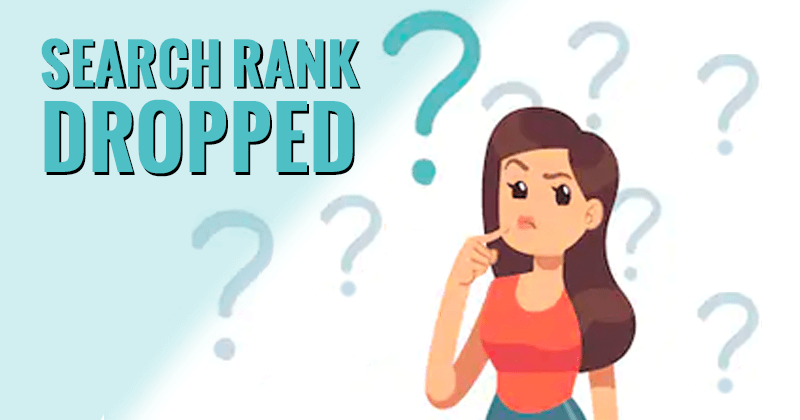I’m Actioning SEO. So Why Has My Search Rank Dropped?

Before reacting, first it’s best to take a look at the basics, meaning, let’s look at the other more natural reasons your search rank could drop.
Could it just be a regular fluctuation?
Just wait a few days and see if your rank bounces back up.
Could it be a seasonality issue? A regular fluctuation in product or service interest?
Compare your rank against previous days, weeks, months and years.
Once you’ve determined that it’s not a natural result of the ebb and flow of doing business, read on to see five other possible reasons.
#1 A Google Change Impacted Your SEO
The world is constantly changing and so is Google. They make algorithm changes almost daily. At least we think they make them daily, unfortunately, when they make a change they don’t tell anyone about it. There’s a whole industry of people though that spend a lot of time trying to figure out Google’s (or Bing’s) algorithm and their changes, so the best is to keep up-to-date with knowledge leaders so you can respond to changes that might affect you (or hire a SEO company like us and we can do that for you). What’s also known, but not necessarily understood, is that Google and Bing’s goal is to satisfy the users search query, not promote your website. And if other websites come along, that are newer and satisfy that search query better than you do, your rank is going to go down. Google doesn’t want to give old answers to new questions. Older material will get pushed lower in the search engine results page (SERP), so keep your website relevant and new.
Action: Check the Google Algorithm Change History from MOZ.com. For Google Analytics, check out the Google Developer Community for updates.
#2 Your Website Impacted Your SEO
In a quest to stay relevant and modern looking, most companies redesign their website every two to three years. In that redesign, you may change internal links, the navigational structure, the copy and so on. All those elements can affect your SEO rank. Review all these elements for impact to SEO, perhaps you overstuffed keywords or no longer used relevant keywords for internal links. Check that your redirects are working and make sure your page load times are still low. And finally, make sure your website is still being crawled by Google.
Action: Make sure you have a Google Search Console and check it for errors.
#3 Your Friends Impacted Your SEO
I don’t mean your actual friends, but rather, all the ways in which other companies or searchers can impact your SEO. Perhaps you used to have a lot of companies link to your blog, but then they redesigned and the link disappeared. To catch this, use a link monitoring tool and if companies or people remove their links to you, you can reach out to them.
What’s less known, but just as true, is that over time, people often search differently and change their keywords. For example, say you used to get the info you needed about dogs just by typing in the keyword dogs, but algorithm changes, or the proliferation of websites devoted to dogs, no longer bring the info that you need to the first or second page. So the response of users is to change how they search, which may mean that your keywords are no longer relevant, so your rank naturally drops.
Action: Google Trends is a fun tool to see what’s changed, but you should also be tracking the keywords that people use to find your site in Google Analytics.
#4 Your Competitors Impacted Your SEO
We hate to be the bearer of bad news, but sometimes you may be doing everything right, and yet, your competitors are doing it better. Perhaps they have bigger budgets than you. Perhaps they wrote better copy that addresses user queries better than you. To understand whether this might be the case, keep an eye on what your competitors are doing. There are many tools out there for social listening, and there’s even a tool (Versionista) that lets you check for changes. At the end of the day, you need to be better than your competitors to list higher than them. Of course, your competitors (or employees) could be sabotaging your SEO, which is something else to consider, albeit it’s less likely if you’re a small company.
Action: Try Versionista and read our blog post on Negative SEO.
#5 You’ve Done Something That’s Impacted Your SEO
Let’s say that you decide to ignore all our warnings and you went to a company that faked a whole bunch of links to your site. Google caught you doing this, so in return, they penalized your site, what’s known as a manual action. If your rank drops in Google and not Bing, then it’s almost a certainty that your site has been penalized by Google. The way to check is to go to your Google Search Console account and look in the messages and the Manual Actions sections. Here, you’ll be told how you’re not meeting Google’s guidelines as well as what you can do about it to fix the problem. We suggest that you follow their suggestions to reverse their decision.
Action: We suggest that you follow Google’s SEO Guidelines always.
Here’s some other blog posts we think might interest you:
3 Big Reasons You Should Engage in Brand Bidding
3 Reasons PPC and SEO Work Better Together
Why Invest Time in Getting Online Reviews? SEO. SEO. SEO.
Great SEO Titles & Descriptions for Better SERP Slugs
How to Hire a Search Engine Optimizer—It’s Not Black Magic
